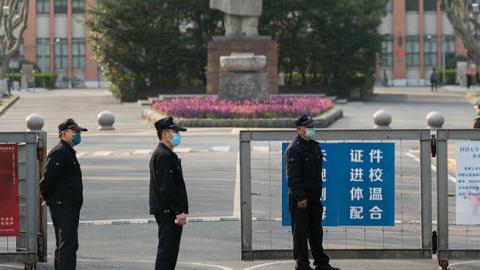The coronavirus is both a public health and global financial crisis. But it is also a geostrategic challenge to America’s power and influence in the Indo-Pacific. Without knowing the full impact of the virus, it seems probable that the shock will amplify several existing economic, technological, and security trends already underway in the region.
First, the post-coronavirus environment will fuel rather than defuse U.S.-China geoeconomic competition. Although pandemics call for international cooperation, the virus that gripped Wuhan and spread globally will exacerbate preexisting tensions between the world’s two largest economies. The coronavirus has damaged China’s already slowing economy. The CCP will likely put off painful economic reforms and look for short-term stimulus. Xi will further abandon economic and financial liberalization reforms accompanying the 19th Party Congress. Toxic debt and the misallocation of capital to state-owned enterprises will mount. At the same time, the CCP will need to shift more resources to deal with a brittle public health system and an aging population. The resulting demands for sustained Chinese growth will ensure that Beijing’s variant of state capitalism will further exploit free-market vulnerabilities through state-backed IP theft, subsidized national champions, and other means. Expect China to deepen investment in the digital technologies that advance both its economic and security interests.
At the same time, the United States economy will also face headwinds. The virus will disrupt the economy and daily life in the United States. Trends suggest the U.S. may experience a recession. Russia’s bid to crush America’s shale-oil may fail, but it adds another stress to a key pillar of the U.S. economy. China may take advantage of even relative U.S. weakness or distraction to back-pedal on its agreement to purchase up to $200 billion in additional U.S. goods, including LNG, over the next two years. Meanwhile, as nations turn inward, expect China to fill the void and build out its network of CCP-compliant or U.S.-independent regional and international institutions.
Second, U..S-China techno-nationalism and protectionism will sharpen. The CCP leveraged Big Data, Artificial Intelligence, facial recognition technology, and drones to police its Wuhan crisis. The positive results will only further accelerate Beijing’s plans to advance the surveillance state further. It will also prompt Beijing to double down on investments in Made in China 2025 technologies vital to achieving information superiority and the China Dream. As a result, America and selected allies are likely to accelerate plans to disentangle critical technologies and reduce strategic dependencies on China. Other countries will also step up plans to relocate manufacturing and business hubs outside of the Mainland. For the United States, the great disentanglement will take time, leadership, and the ability to mobilize the private sector and coalition partners. One challenge might be called the Microsoft problem. That is, how can a large U.S. company wholly cut itself off from Huawei, ZTE, and other Chinese national champions without reducing its market share and thereby starving itself of necessary R&D for future innovation? The virus is also likely to hasten competition for setting international technology standards and rules.
Third, the coronavirus will create new fissures in the CCP and a potential leadership crisis in North Korea. China’s initial cover-up on the severity of the outbreak created a moment that could be Xi’s “Chernobyl,” especially in the wake of revelations regarding the brutal crackdown in Xinjiang, heavy-handedness in Hong Kong and harassment of Taiwan. The persistent criticism of Xi’s early attempts at covering up the scope of the outbreak, and his call for the Chinese people to follow him in a “People’s War” is instructive of both enduring CCP legitimacy problems and Xi’s preferred theory of victory narrative.
Meanwhile, a full-blown health crisis in North Korea could produce unpredictable outcomes for the hereditary Kim dynasty. Just as North Korea’s Sixth Army Corps reportedly mutinied amid the 1996 famine, an overwhelmed public health system could trigger a coup or, even worse, propel Kim Jong Un into initiating a conflict to unify the population behind him. The virus also is likely to reify other existing security flashpoints. These include tensions over Taiwan as well as between the United States, its allies, and security partners. Pressure on U.S. allies and partners will grow, even as they seek to resist demands to share more significant burdens and risk getting caught in a potential major power conflict. Expect China to pray upon alliance tensions.
Fourth, the threats emanating from synthetic biology will multiply. The coronavirus most likely started in an illegal wet market, not a biology lab. However, the demonstrated impact of a dangerous new virus could encourage CCP authorities to set in motion new plans to weaponize synthetic biology. A range of future biothreats may emerge from clandestine laboratories through the use of CRISPR, DNA printing, and other synthetic biology advances. The CCP’s technological gains could encourage it to think the unthinkable: namely, how it might surreptitiously plant a future virus for economic, political, and strategic impact, perhaps amid a crisis or conflict.
Read in Eurasia Review

















